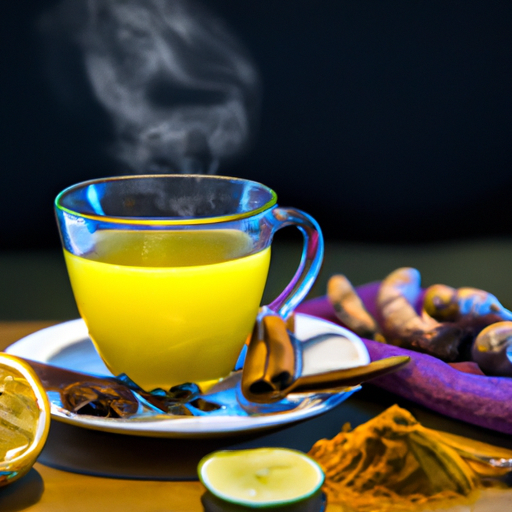Imagine a warm, golden elixir that not only tantalizes your taste buds but also nourishes your body from the inside out.
Turmeric tea, like a ray of sunshine in a cup, is a soothing and invigorating beverage that has gained popularity for its numerous health benefits.
This aromatic concoction is made by infusing the vibrant turmeric root, known for its anti-inflammatory properties and radiant yellow color, with a blend of other wholesome ingredients.
Ginger adds a fiery kick and aids digestion, while cinnamon lends a touch of sweetness and boasts antioxidant properties.
Black pepper provides a hint of heat and enhances the absorption of curcumin, the active compound in turmeric.
For those with a sweet tooth, honey can be added, offering natural sweetness and potential immune-boosting properties.
A squeeze of lemon not only enhances the taste but also provides a dose of vitamin C and antioxidants.
And for a creamy twist, coconut milk adds a decadent flavor and potential digestive and immune system benefits.
So, let’s delve into the world of turmeric tea and discover the magic that lies within its ingredients.
Key Takeaways
- Turmeric tea is made by infusing turmeric root with other ingredients like ginger, cinnamon, black pepper, honey, lemon, and coconut milk.
- Turmeric root contains curcumin, a compound that reduces inflammation and has antioxidant properties.
- Ginger, cinnamon, and black pepper are often added to turmeric tea for their additional health benefits, such as aiding digestion, reducing nausea, regulating blood sugar levels, and enhancing the absorption of curcumin.
- Honey, lemon, and coconut milk are popular additions to turmeric tea for their taste and potential health benefits, including immune-boosting properties, vitamin C content, antioxidant capacity, and digestive support.
Turmeric Root: The star ingredient of turmeric tea, this vibrant root is known for its anti-inflammatory properties and bright yellow color.
You’ll love the rich, golden hue and the soothing aroma of turmeric root as it infuses into your tea, offering a burst of anti-inflammatory goodness. Turmeric root is the star ingredient of turmeric tea, known not only for its vibrant color but also for its numerous health benefits. This powerful root has been used for centuries in traditional medicine due to its potent anti-inflammatory properties.
It contains a compound called curcumin, which has been shown to reduce inflammation in the body and alleviate symptoms of chronic conditions such as arthritis.
In addition to its anti-inflammatory effects, turmeric root is also rich in antioxidants, which help protect the body against free radicals and oxidative stress. These antioxidants contribute to the overall well-being of the body and may even have anti-cancer properties.
When it comes to making turmeric tea, there are various recipes available. Some popular options include adding black pepper to enhance the absorption of curcumin, using honey or lemon for added flavor, or even combining turmeric with other spices like cinnamon and cardamom for a unique taste experience.
Ginger, another powerful root, is often paired with turmeric in tea recipes. This combination not only adds a spicy kick to the tea but also brings additional health benefits. Ginger has long been used to aid digestion and reduce nausea, making it a perfect complement to the anti-inflammatory properties of turmeric. Together, turmeric and ginger create a flavorful and health-enhancing tea that can be enjoyed daily.
Transitioning into the subsequent section about ginger, it’s important to note that this versatile root offers its own set of unique benefits when combined with turmeric.
Ginger: Often paired with turmeric, ginger adds a spicy kick and additional health benefits such as aiding digestion and reducing nausea.
Paired with turmeric, ginger not only adds a spicy kick to the drink, but also offers additional health benefits such as aiding digestion and reducing nausea, making it a versatile ingredient to consider. Ginger has been used for centuries in traditional medicine for its medicinal properties. It contains a compound called gingerol, which has powerful anti-inflammatory and antioxidant effects. These properties can help reduce inflammation in the body and protect against chronic diseases.
In addition to its health benefits, ginger also has culinary uses. It adds a unique flavor to dishes and beverages, making it a popular ingredient in Asian cuisine. Its spicy and aromatic taste pairs well with the earthy flavor of turmeric, creating a delicious and refreshing combination in turmeric tea.
To further illustrate the benefits of ginger, here is a table showcasing some of its key health benefits:
| Health Benefit | Description |
|---|---|
| Aid in digestion | Ginger has been shown to increase the production of digestive enzymes, improving digestion and reducing bloating. |
| Reduce nausea | Ginger is commonly used to alleviate nausea, whether it’s caused by motion sickness, morning sickness during pregnancy, or chemotherapy-induced nausea and vomiting. |
| Anti-inflammatory | The gingerol in ginger has anti-inflammatory properties, which can help reduce inflammation and pain in the body. |
| Antioxidant | Ginger contains antioxidants that help protect the body against oxidative stress and damage caused by free radicals. |
| Boost immunity | The immune-boosting properties of ginger can help strengthen the immune system and protect against infections. |
Next, let’s explore the benefits of another key ingredient in turmeric tea: cinnamon. This warm and aromatic spice adds a hint of sweetness to turmeric tea and is known for its antioxidant and anti-inflammatory properties.
Cinnamon: This warm and aromatic spice adds a hint of sweetness to turmeric tea and is known for its antioxidant and anti-inflammatory properties.
Cinnamon, with its warm and aromatic flavor, brings a touch of sweetness and a host of antioxidant and anti-inflammatory properties to your daily beverage. Beyond its delicious taste, cinnamon has been used for centuries in various cultures for its health benefits. It’s known to help regulate blood sugar levels, reduce inflammation, and boost the immune system.
Adding cinnamon to other beverages, such as coffee or hot chocolate, can provide similar benefits and enhance the overall flavor.
When it comes to alternative spices that can be used in turmeric tea, there are several options. One popular choice is cardamom, which adds a unique and slightly sweet flavor to the tea. Cardamom also has antioxidant properties and may help improve digestion.
Another option is nutmeg, which has a warm and slightly nutty taste. Nutmeg is known for its antibacterial properties and can aid in digestion as well.
As we move into the next section about black pepper, it’s important to note that adding a touch of heat, black pepper also helps to enhance the absorption of the active compound in turmeric, curcumin. This combination of spices creates a powerful and flavorful drink that not only tastes great but also provides numerous health benefits.
Black Pepper: Adding a touch of heat, black pepper also helps to enhance the absorption of the active compound in turmeric, curcumin.
Black pepper, with its touch of heat, plays a crucial role in enhancing the absorption of curcumin, the active compound in turmeric. Here are four reasons why black pepper is an essential ingredient in turmeric tea:
-
Increased Bioavailability: The piperine compound found in black pepper helps to improve the bioavailability of curcumin. This means that consuming black pepper alongside turmeric allows your body to absorb and utilize curcumin more effectively.
-
Anti-Inflammatory Effects: Black pepper itself possesses anti-inflammatory properties. When combined with turmeric, these two spices work synergistically to provide even stronger anti-inflammatory benefits, potentially relieving symptoms of conditions like arthritis.
-
Antioxidant Power: Both turmeric and black pepper are rich in antioxidants. Antioxidants help to neutralize harmful free radicals in the body, protecting cells from damage and reducing the risk of chronic diseases.
-
Flavor Enhancement: Black pepper adds a pleasant heat and depth of flavor to turmeric tea. It enhances the taste profile and complements the earthy notes of turmeric, making the tea more enjoyable to drink.
Now that we understand the importance of black pepper, let’s move on to another popular addition to turmeric tea: honey. For those who prefer a touch of sweetness, honey provides natural sweetness and potential immune-boosting properties.
Honey: For those who prefer a touch of sweetness, honey is a popular addition to turmeric tea, providing natural sweetness and potential immune-boosting properties.
To add a touch of sweetness to your turmeric concoction, honey is the bee’s knees. It provides a natural and flavorful boost along with potential immune-boosting properties. Not only does honey offer a deliciously sweet taste, but it also serves as a healthier alternative to refined sugars often used in beverages.
This golden liquid is packed with nutrients, including antioxidants and antibacterial properties, which can help support a healthy immune system. Additionally, honey has been used for centuries as a natural remedy for coughs and sore throats, making it a perfect addition to your turmeric tea if you’re feeling under the weather.
While honey is the most popular sweetener for turmeric tea, there are other alternatives available for those who may prefer different flavors or have dietary restrictions. Some alternatives to honey include maple syrup, stevia, or coconut sugar. Each of these options can add a touch of sweetness to your turmeric tea while providing their own unique flavors and health benefits.
Now, let’s move on to lemon. Adding a refreshing citrus flavor, lemon not only enhances the taste of turmeric tea but also provides a dose of vitamin C and antioxidants.
Lemon: Adding a refreshing citrus flavor, lemon not only enhances the taste of turmeric tea but also provides a dose of vitamin C and antioxidants.
Lemon adds a burst of refreshing citrus goodness, infusing the turmeric concoction with a zesty tang and delivering a vitamin C boost to invigorate the senses. Not only does lemon enhance the taste of turmeric tea, but it also brings numerous health benefits.
One of the key advantages of incorporating lemon into turmeric tea is its high vitamin C content. Vitamin C is a powerful antioxidant that helps protect our cells from damage caused by free radicals, which are unstable molecules that can contribute to chronic diseases. Additionally, vitamin C plays a vital role in supporting our immune system, promoting wound healing, and aiding in the absorption of iron.
Lemons are also packed with flavonoids, natural compounds with antioxidant properties. These antioxidants work to neutralize harmful free radicals and reduce inflammation in the body. By adding lemon to your turmeric tea, you can enhance its antioxidant capacity and potentially boost its overall health benefits.
With the refreshing taste of lemon and its abundance of vitamin C and antioxidants, it’s no wonder why it’s a popular addition to turmeric tea.
As we move on to the next section about coconut milk, we’ll explore how it can provide a creamy and indulgent twist to this vibrant beverage while offering potential health benefits such as promoting healthy digestion and boosting the immune system.
Coconut Milk: For a creamy and indulgent twist, coconut milk can be added to turmeric tea, providing a rich flavor and potential health benefits such as promoting healthy digestion and boosting the immune system
Indulge yourself in a creamy and decadent experience by adding coconut milk to your turmeric concoction, giving it a velvety texture and potentially aiding in healthy digestion and immune system support. Coconut milk is a delicious and nutritious addition to turmeric tea, offering a range of benefits for your overall well-being.
Coconut milk is derived from the flesh of mature coconuts and is rich in healthy fats, vitamins, and minerals. It contains lauric acid, a medium-chain fatty acid that has been shown to have antimicrobial and antiviral properties, which can help support a healthy immune system. Additionally, coconut milk is a good source of manganese, copper, and iron, which are essential minerals for various bodily functions.
When combined with ginger and turmeric, coconut milk creates a delightful flavor combination that not only tantalizes your taste buds but also provides numerous health benefits. Ginger and turmeric are both known for their anti-inflammatory and antioxidant properties. The addition of coconut milk enhances these benefits, as the healthy fats in coconut milk help to increase the absorption of curcumin, the active compound in turmeric responsible for its powerful anti-inflammatory effects.
To summarize the benefits of adding coconut milk to your turmeric tea:
| Benefit | Description |
|---|---|
| Creamy Texture | Coconut milk adds a velvety texture to your turmeric tea, making it even more indulgent. |
| Healthy Digestion | Coconut milk is known to promote healthy digestion and can help soothe the digestive system. |
| Immune System Support | The antimicrobial properties of coconut milk can aid in boosting your immune system. |
So why not elevate your turmeric tea experience by adding a splash of coconut milk? Not only will it enhance the flavor, but it will also provide potential health benefits for your body.
Frequently Asked Questions
What are the potential health benefits of turmeric tea?
Potential health benefits of turmeric tea include reduced inflammation, improved digestion, enhanced brain function, and strengthened immune system. However, it’s important to note that there may be potential side effects and the recommended dosage should be followed.
Can turmeric tea help with reducing inflammation?
Turmeric tea, a tantalizing tonic, has been shown to aid in reducing inflammation. It serves as a natural remedy for pain relief and also promotes healthy digestion.
How does black pepper enhance the absorption of curcumin in turmeric tea?
Black pepper enhances the absorption of curcumin in turmeric tea through its active compound, piperine. Piperine inhibits an enzyme that breaks down curcumin in the liver, allowing more curcumin to enter the bloodstream and exert its anti-inflammatory effects.
What are the potential health benefits of adding coconut milk to turmeric tea?
Adding coconut milk to turmeric tea can provide potential health benefits. It contains medium-chain fatty acids that may aid in weight loss, improve heart health, and support brain function. Plus, coconut milk alternatives can be used in various turmeric tea recipes.
Is it necessary to add honey or lemon to turmeric tea, or can it be enjoyed plain?
I prefer to enjoy plain turmeric tea without adding honey or lemon, as it has a unique and earthy flavor. However, if you prefer a sweeter taste, some alternative sweeteners for turmeric tea include stevia, maple syrup, or agave nectar.
Conclusion
After delving deep into the ingredients of turmeric tea, it becomes clear that this golden elixir is a powerhouse of health benefits. The vibrant turmeric root, the spicy ginger, the aromatic cinnamon, and the fiery black pepper all come together to create a symphony of flavors that soothes the body and soul. And let’s not forget the touch of sweetness from honey and the refreshing burst from lemon. It’s like a warm embrace on a cold winter’s day, providing not just comfort but also a boost to your immunity.
So why not indulge in a cup of turmeric tea and let its magical blend transport you to a world of wellness and vitality?










